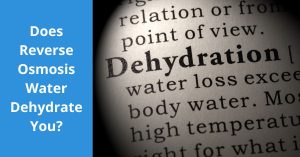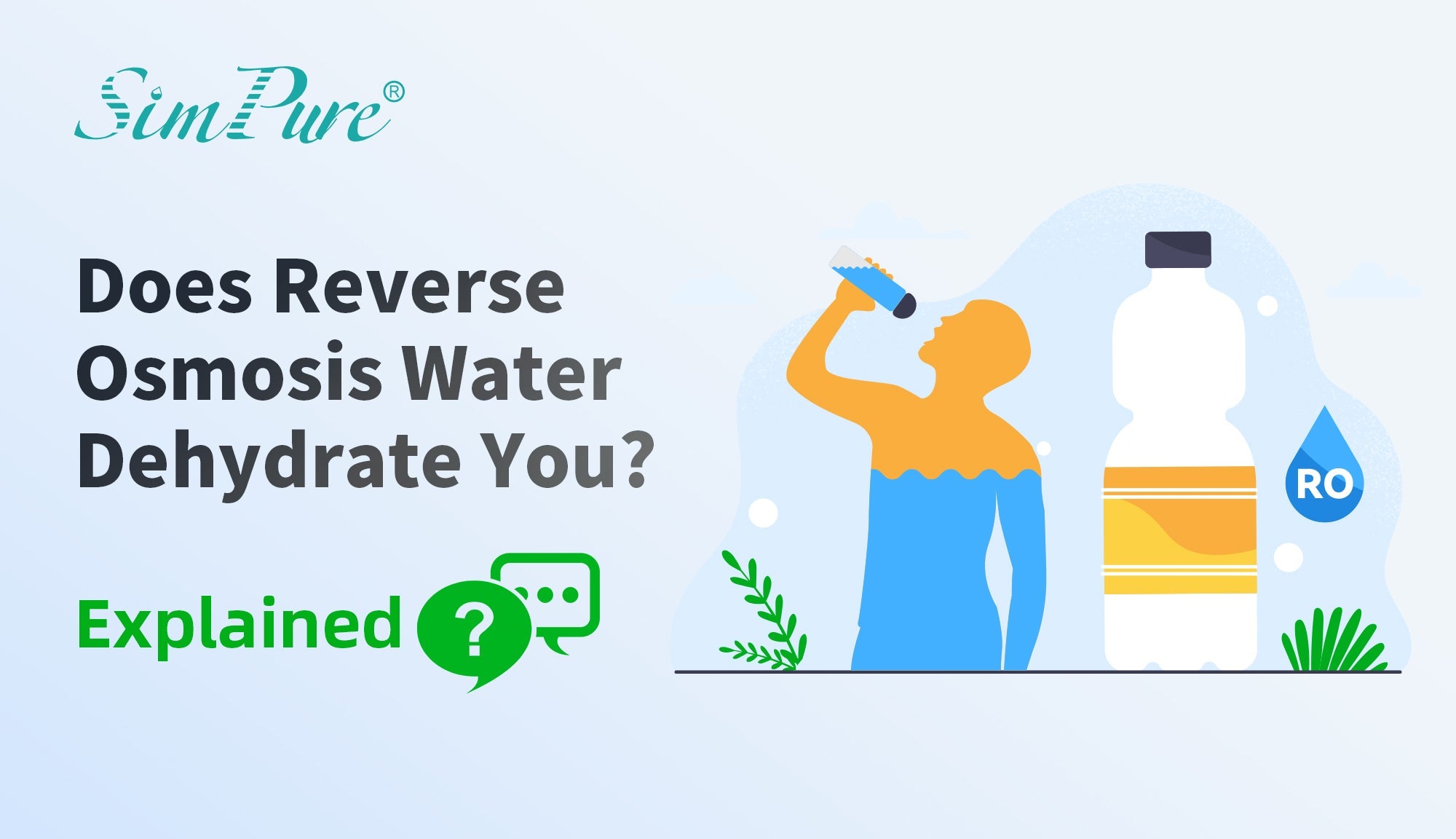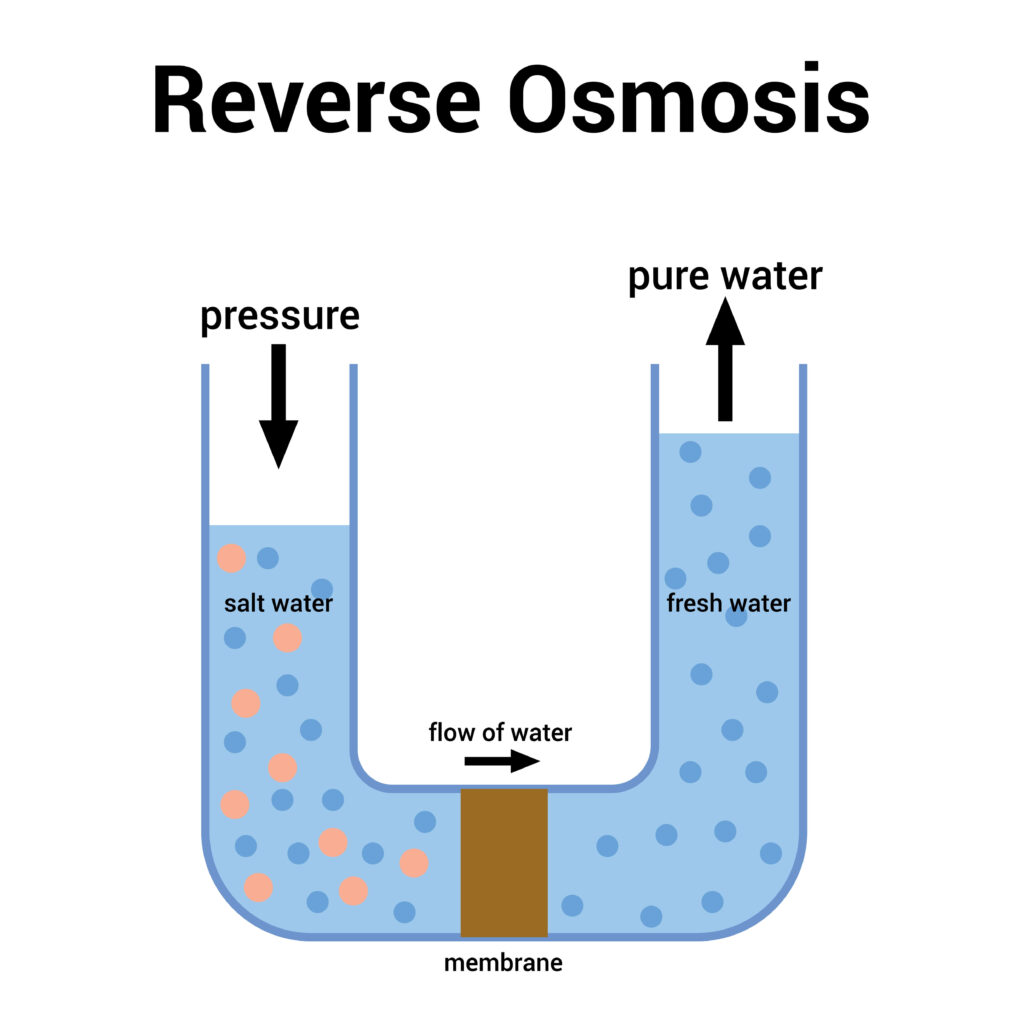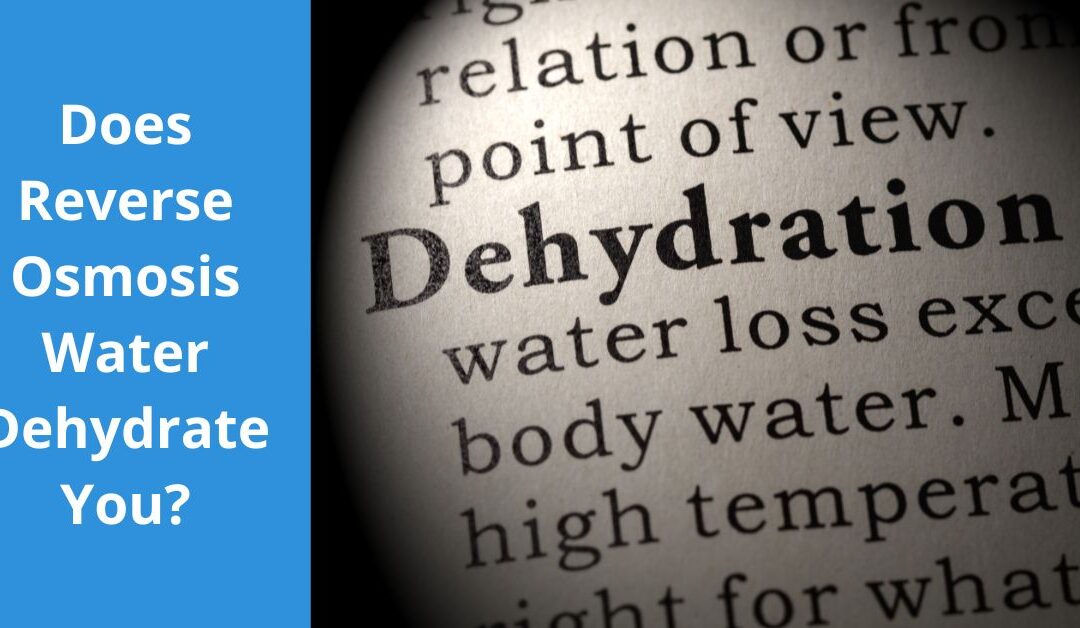Have you ever wondered if the water you’re drinking is actually keeping you hydrated? You might think that all water is the same, but that’s not quite true.
Reverse osmosis (RO) water, a popular choice for many households, is known for its purity. However, there’s an ongoing debate about whether it could potentially lead to dehydration. This might sound surprising, but understanding the science behind it is crucial for your health.
Imagine drinking water all day, yet still feeling thirsty and tired. Could your choice of water be the culprit? Keep reading, and discover if your hydration routine needs a tweak. Your well-being could depend on it.
Ro Water Basics
Reverse Osmosis (RO) water is a common choice for drinking. It is popular due to its clean and pure nature. Many homes now use RO systems for water purification. But, there are concerns about its effects on health. Understanding RO water can help address these concerns.
What Is Ro Water
RO water is water that has been filtered through a special process. This process removes impurities and contaminants. The aim is to deliver water that is free from harmful substances. This makes it appealing for health-conscious individuals.
How Reverse Osmosis Works
Reverse osmosis uses a semi-permeable membrane. Water passes through this membrane under pressure. The membrane blocks larger particles and impurities. Only small water molecules get through. As a result, you get clean and safe drinking water.
RO systems often have multiple filtration stages. These stages ensure thorough purification. Each stage targets different contaminants. This makes RO water very pure compared to tap water.

Credit: www.livingwhole.com.au
Health Myths And Facts
Water is essential for life. Yet, myths about its consumption abound. Among these myths is the notion that RO (Reverse Osmosis) water can cause dehydration. This belief can lead to confusion about water safety and health. Understanding the facts can help dispel these myths.
Common Myths About Ro Water
Many believe RO water strips essential minerals. They think it lacks nutrients needed for hydration. Some even say it causes mineral deficiency. Others argue it leads to dehydration. These myths can cause unnecessary fear. But are these claims true?
Scientific Evidence On Ro Water
Research shows RO water is safe for drinking. It removes contaminants effectively. This makes it pure and clean. The process does remove some minerals. But these minerals are not the main hydration source. Our bodies get minerals from food.
Studies confirm RO water hydrates well. It provides the necessary water intake. The notion of dehydration from RO water lacks evidence. Experts agree that drinking it is safe. It supports overall hydration and health.
Mineral Content In Water
Water is essential, but did you know that not all water is the same? The mineral content in your water can significantly impact your health. You might assume that pure water is always better, but the story is more complex.
Imagine drinking water that lacks key minerals your body needs. When water goes through a Reverse Osmosis (RO) system, important minerals might be removed. This could lead to unexpected health effects, which we’ll explore further.
Minerals Removed By Ro
RO systems are effective at purifying water by removing impurities. However, they also strip away beneficial minerals like calcium, magnesium, and potassium. These minerals are vital for bodily functions.
Calcium supports strong bones. Magnesium aids muscle function. Potassium balances your body’s fluids. Without these minerals, your body might struggle to function optimally.
Think about it: would you prefer mineral-rich spring water over purified RO water? The choice isn’t always straightforward, especially if RO water lacks what your body needs.
Impact On Health
When RO water lacks essential minerals, it can affect your health in subtle ways. You might feel more fatigued or notice muscle cramps. These could be signs of mineral deficiency.
It raises the question: could drinking RO water lead to dehydration? While RO water hydrates, it might not replenish the minerals your body loses through sweat and daily activities.
Consider adding mineral supplements or choosing foods rich in calcium, magnesium, and potassium. This way, you can maintain a balanced mineral intake while enjoying the purity of RO water.
Have you ever felt different after switching water types? Your experience could be a clue about your mineral needs. Understanding the mineral content in water can help you make healthier choices.
Hydration And Ro Water
RO water, often used for its purity, doesn’t cause dehydration. It removes impurities and minerals, leaving clean water. Drinking RO water contributes to daily hydration needs effectively.
Hydration is a crucial aspect of maintaining a healthy lifestyle. You might wonder how different water types contribute to your hydration levels. One such type is Reverse Osmosis (RO) water. RO water is popular for its purity, but does it hydrate you effectively? Let’s dive into the world of RO water and its impact on hydration.Does Ro Water Hydrate?
RO water is free from impurities, making it a clean option for drinking. It lacks minerals like calcium and magnesium, but it still quenches your thirst. Imagine drinking a glass of RO water after a workout. You feel refreshed, yet you might wonder if it’s replenishing your body as effectively as mineral-rich water. While RO water hydrates, it may not provide the electrolytes your body craves. Think about the last time you felt dehydrated after drinking plain water. You might benefit from adding a pinch of salt or a splash of lemon to your RO water. This simple adjustment can enhance hydration by replacing lost minerals.Comparing Ro Water To Other Sources
RO water is often compared to spring and tap water. Each has unique benefits. Spring water is naturally rich in minerals, supporting your body’s needs during intense activities. Tap water, depending on your location, might contain essential minerals but could also include impurities. RO water, on the other hand, offers purity but lacks minerals. Consider a time when you had a choice between RO and spring water at a picnic. You chose spring water for its mineral content, which helped maintain your energy levels throughout the day. What’s your go-to water source? The choice might depend on your daily activities. If you lead an active lifestyle, you might prefer water with minerals to support your hydration needs. Incorporating variety in your water choices can enhance your hydration strategy. Try alternating between RO, spring, and tap water to balance purity and mineral intake. Your hydration journey is personal. Pay attention to how your body responds and adjust your water intake accordingly.Potential Risks
Drinking RO water, while seemingly pure and clean, can sometimes carry risks that might surprise you. Many people are unaware of the potential downsides of consuming water stripped of its minerals and nutrients. Let’s explore these risks and understand how RO water might affect your health.
Electrolyte Imbalance
Imagine your body as a finely tuned orchestra, where electrolytes are the musicians playing in harmony. RO water, having removed essential minerals like sodium and potassium, can disrupt this balance. This imbalance might lead to muscle cramps, fatigue, or dizziness.
Consider the last time you felt unusually tired after a workout. Was your water intake sufficient in minerals? Electrolytes are critical for nerve function and hydration. Without them, your body’s ability to retain water diminishes, potentially leading to dehydration.
Nutrient Deficiency Concerns
Every sip of water is an opportunity to replenish your body’s nutrients. RO water lacks minerals such as calcium and magnesium, which are crucial for bone health and metabolic functions. Over time, relying solely on RO water may contribute to deficiencies.
Have you noticed any changes in your energy levels or bone strength lately? While water isn’t your primary source of these nutrients, it plays a supportive role. Ensuring your diet compensates for this lack is vital to maintaining your health.
Next time you reach for a glass of RO water, think about its impact on your body’s mineral balance. Are you supplementing your diet with necessary nutrients? Could adding mineral-rich foods or supplements be beneficial for you?
Understanding these potential risks allows you to make informed decisions. How will you ensure your hydration strategy meets your body’s needs without sacrificing essential nutrients?

Credit: www.simpurelife.com
Benefits Of Ro Water
Reverse Osmosis (RO) water offers numerous benefits. It stands out for its ability to remove contaminants effectively. This process ensures water is not only clean but also safe for consumption. Many turn to RO water for its enhanced purity and taste.
Purity And Safety
RO water boasts unmatched purity levels. It filters out harmful substances like lead and mercury. This makes it a safe choice for daily consumption. For families, especially those with young children, safety is paramount. RO systems ensure every drop is free from impurities.
Taste And Quality
Many find RO water tastes better than regular tap water. The absence of chlorine and other chemicals enhances its flavor. This quality makes it a favorite for cooking and brewing beverages. With RO water, every sip feels refreshing and pure.
Balanced Water Consumption
Water is essential for life, yet drinking it in the right way is crucial to maintaining health. The debate over whether reverse osmosis (RO) water could cause dehydration is a hot topic. Understanding balanced water consumption can help you make informed choices about your hydration habits.
Supplementing Minerals
RO water is purified by removing impurities, but this process can also strip away essential minerals. Minerals like calcium and magnesium are vital for your body’s functions. Without them, you might feel less hydrated, even if you drink plenty of water.
To counter this, consider integrating foods rich in these minerals into your diet. Leafy greens, nuts, and dairy products can help replenish what you might be missing. Some people add mineral drops to their RO water, ensuring they get the nutrients they need.
Have you ever wondered if your water is providing all it should? If your energy levels drop despite staying hydrated, it might be time to rethink your water strategy.
Choosing The Right Water
The type of water you choose to drink can impact your hydration levels. While RO water offers purity, it may not always be the best choice for everyone. Some prefer spring or mineral water, which naturally contains beneficial minerals.
Consider your lifestyle and health needs when choosing your water. If you’re physically active, your body might require more minerals to perform optimally. Always check labels and do a bit of research to find a water type that suits you best.
Are you open to experimenting with different water types to see how your body reacts? Sometimes, a simple switch can make a big difference in how you feel.
Remember, the key is balance. By supplementing essential minerals and choosing the right water, you can enhance your hydration and overall well-being. Stay curious and listen to your body’s signals—it knows what it needs.

Credit: www.cruiserowaterandpower.com
Frequently Asked Questions
Can Drinking Ro Water Lead To Dehydration?
RO water does not cause dehydration. It is purified, removing contaminants and impurities. However, minerals like calcium and magnesium are also removed. Consuming a balanced diet ensures mineral intake. Drink RO water freely, as it hydrates similarly to regular water.
Is Ro Water Safe For Daily Consumption?
Yes, RO water is safe for daily consumption. It effectively removes harmful contaminants, providing clean water. While it lacks minerals, a balanced diet compensates for this. RO water is a healthy choice, ensuring hydration without impurities.
Does Ro Water Affect Electrolyte Balance?
RO water lacks electrolytes like sodium and potassium. Regular water sources may contain these naturally. While RO water doesn’t affect balance directly, consume electrolyte-rich foods and beverages to maintain healthy levels.
Can Ro Water Impact Mineral Intake?
RO water removes minerals like calcium and magnesium. These minerals are essential for health. A balanced diet compensates for the lack. Consuming mineral-rich foods ensures adequate intake, making RO water a safe hydration choice.
Conclusion
Ro water does not cause dehydration. It provides essential hydration safely. Drinking RO water is safe and keeps you hydrated. It removes impurities, ensuring clean drinking water. While it lacks some minerals, regular food intake compensates. Adequate water intake is key to staying hydrated.
So, drink RO water without worry. Stay hydrated and healthy by drinking enough water each day. Balance is important. Ensure you get minerals from other sources. Drinking RO water is a safe choice. It supports daily hydration needs. Embrace the benefits of clean, purified water.
Stay hydrated, stay healthy.

Hasan Al Sarker is a Reverse Osmosis Specialist. He has worked for many years to ensure safe drinking water for all. His research paper has been published in several journals, including Issue, Medium, and Slideshare. He is recognized as a water doctor among specialists though he did not attend medical college.
Besides working as a researcher of reverse osmosis technology, he is also very fancy with the kitchen and cooking. His guides are reading thousands of people every day. As a head of content, he is responsible for all the published articles at RO System Reviews.

